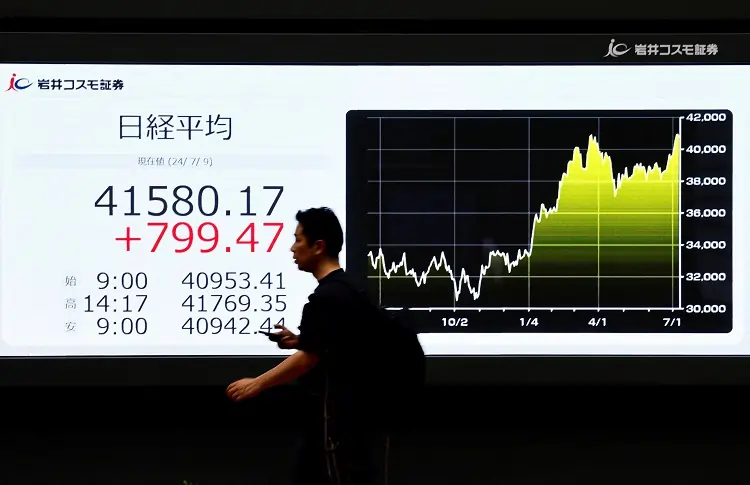
Asian stocks slide on rising trade tensions, yen climbs
By Ankur Banerjee
SINGAPORE (Reuters) – Asian equities fell on Thursday, led by chip stocks as investors fret over the prospect of escalating trade tensions between the U.S. and China, while the yen surged to a six-week high in the wake of suspected interventions by Tokyo last week.
The U.S. dollar loitered near its weakest in four months against a basket of currencies as comments from Federal Reserve officials bolstered the case for a cut in September, keeping gold prices near record highs.
MSCI’s broadest index of Asia-Pacific shares outside Japan fell 0.57%, with tech heavy South Korean shares down nearly 1%. The yen’s strength and a sharp drop in chip stocks took Japan’s Nikkei down 2%.
China stocks also slipped as investors awaited policy news from a key leadership gathering in Beijing. The Shanghai Composite index was down 0.4% and blue-chip CSI300 index off 0.5%.
A report that the United States was considering tighter curbs on exports of advanced semiconductor technology to China sent chip stocks and the Nasdaq tumbling overnight, led by AI darling Nvidia and Apple. [.N]
Investor nerves were also jangled after Republican presidential candidate Donald Trump said Taiwan “did take about 100% of our chip business” and should pay the U.S. for its defence as it does not give the country anything.
The comments sent shares of Taiwan Semiconductor Manufacturing Co sharply lower on Wednesday ahead of its second quarter earnings later on Thursday. TSMC shares slumped 3% in early trading, with the broader index down nearly 2%.
“We’re seeing quite a few divergences across key markets, most of which can be tied back to U.S. politics one way or another,” said Matt Simpson, senior market analyst at City Index.
“And this could just be the beginning of broken correlations making a comeback as markets figure out who will do what in the U.S. political landscape.”
Investors are fully pricing in a 25 basis point rate cut in September after Federal Reserve officials said on Wednesday the U.S. central bank was “closer” to cutting interest rates, citing the progress in inflation easing close to its 2% target.
That has left the dollar struggling, with the euro steady at $1.09385 near the four-month high it touched on Wednesday. Sterling was last at $1.30065, close to a one-year peak touched in the previous session.
Investor attention will be on the policy decision from the European Central Bank later in the day, where the central bank is expected to stand pat, although comments from officials will be crucial in gauging when the next rate cut will come.
The dollar index, which measures the U.S. currency versus six peers, was last at 103.69, just above the four-month low of 103.64 it touched on Wednesday.
“Looking beyond the next few weeks means seeing that falling U.S. inflation expectations will reach its limits by late 2024,” Thierry Wizman, global FX and rates strategist at Macquarie said in a note. “That a Trump policy agenda will be associated with U.S. inflation, not disinflation, and that the Fed’s easing cycle will, ultimately, be shallow, not deep.”
The yen hit a six-week high against the dollar at 155.37 in early trading after a sharp rise on Wednesday that had traders suspecting Japanese authorities were once again in the market supporting the currency.
Bank of Japan data suggested Tokyo may have bought nearly 6 trillion yen last week to lift the frail yen away from the 38-year lows it has been rooted to since the start of the month.
The yen has dropped 9.5% against the dollar this year as the wide interest rate difference between the U.S. and Japan weigh, creating a lucrative trading opportunity, in which traders borrow the yen at low rates to invest in dollar-priced assets for a higher return, known as carry trade.
In commodities, gold was 0.18% higher at $2,462 per ounce just below the record high of $2,483.60 it touched on Wednesday. [GOL/]
(Editing by Jacqueline Wong)


